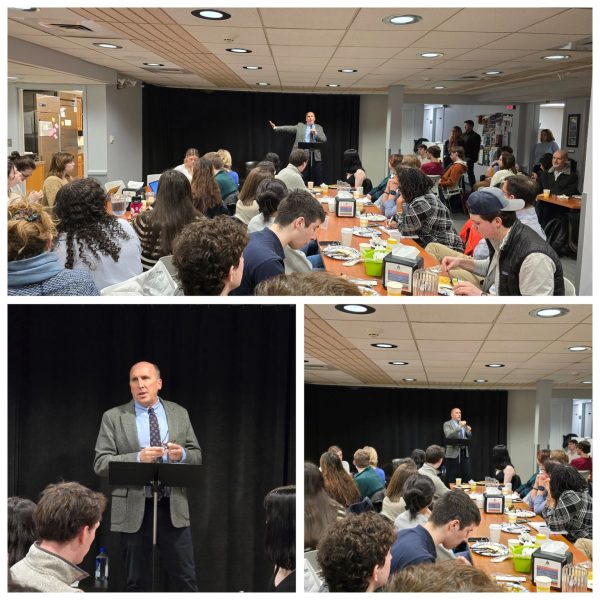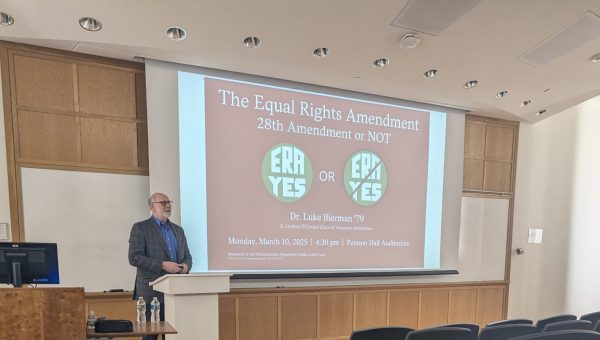Powell Speaks on Leadership and American Optimism
Forty-five hundred students, faculty and staff, alumni, parents, grandparents and local residents flocked to the Sanford Field House on the night of Friday, April 3, for a lecture by former Secretary of State General Colin Powell. The lecture, titled “Leadership: Taking Charge,” was the third installment of the Global Leaders Lecture Series, which last year brought His Holiness the 14th Dalai Lama of Tibet to Colgate.
Powell was introduced by Maxine Kerschner P’07, P’09, the Co-Chair of the Parents’ and Grandparents’ Fund, which sponsors the Global Leaders Lecture Series, and then by President of the University and Professor of Philosophy and Religion Rebecca Chopp.
“It’s a great pleasure to be with you,” Powell began. “I’m one of those down-staters and I’ve never been to this beautiful part of our state before.”
He continued with humor, something he did often throughout the lecture.
“I’ve got to be candid and honest: at this point in my career, it’s a great pleasure to be anywhere,” Powell said.
He spoke about retirement from public life, humorously lamenting the loss of the personal airplane that he used while serving as Secretary of State.
“It’s not easy,” Powell said. “One day all of the television reporters want to speak with you…One day you are the number one diplomat in the entire world and the next day you ain’t. It’s not easy.”
He then spoke about American optimism, a recurring subject of his lecture.
“My real joy is coming back to Washington after meeting with a group like this, which shows that American optimism and confidence is still alive and well,” Powell said. “I only wish sometimes I could bottle up the optimism of the countryside and pour it over the heads of Washington.”
He spoke of his efforts working to establish an educational center connected with the Vietnam Veterans Memorial in Washington, D.C. and segued into a discussion of some problems that America faces.
“One-third of our kids are not finishing high school,” Powell said. “Fifty percent of our minority kids are not finishing high school. This is unacceptable and something that America cannot afford.”
He moved on to talk about national security, reflecting on a conversation he had with President George W. Bush about the fact that increased security measures were deterring foreign students from studying in the U.S.
He also recounted the hassle of being searched at airport security his first time on a commercial flight, and recalled jokingly saying, “Why don’t you go over there and look for Osama Bin Laden?” until he remembered that it was he who put that security system in place.
“9/11 was such a shock,” Powell said. “We didn’t believe they could do it, but they could and they did and they might do it again. We have to keep our vigilance up.”
Powell explained that this prospect is a result of globalization.
“We have to compete in a flattening world,” Powell added. “We are a welcoming, generous, open, compassionate people. Not a sitcom. Not a Michael Moore book…Terrorism will be with us forever…and a terrorist might knock down another building, but one thing that terrorists can never do is to change who we are as a generous, open people.”
Powell then got to the heart of his message: a discussion of leadership based on experiences he gained during his extensive career in the Army and as National Security Advisor, Chairman of the Joint Chiefs of Staff and Secretary of State for President George W. Bush.
“The whole focus of leadership is not on the leaders but on the followers,” Powell said. “You will become responsible for people. Remember that they are the ones who get the work done. The job is to put people in the best positions to achieve what you need.”
He then gave his first piece of advice for leaders.
“Have a clear sense of purpose,” Powell said. “Have goals, have a mission. The word I prefer is purpose. Make sure you convey a purpose…Great leaders are those with an infectious passion.”
His next piece of advice was taken directly from his Army experience.
“Take care of the troops,” Powell said. “Give them whatever they need to get the job done. Make sure you also commend them when they’ve done the right thing. It is that human connection that is the glue that holds things together…Develop the fortitude to be realistic and not to turn away from problems but to face them even if it means hurting someone’s feelings.”
He gave a simple example of the importance of this connection from his time as Secretary of State, when he asked the parking attendants he saw every day how they decided who got the best parking spots in the garage. They replied that if someone opened their window and asked them how they were doing, they got the good spots, whereas if someone didn’t acknowledge them, they got the bad ones.
His next example of good leadership skills came from Barack Obama, who Powell famously endorsed for the presidency during last November’s election.
“[Obama] had a vision for himself and for the country,” Powell said. “He had purpose…confidence but not arrogance.”
He recounted the moment when he heard that Obama had been elected as a physical shock.
“We did it, and by so doing took our country to a new level,” Powell said. “This is a new era…a new generation. Those of us in our seventies are handing leadership over to people in their forties who are handing it down to those in their twenties here at Colgate.”
Powell then spoke again about the challenges that America faces, and related them to the time when he met Russian leader Mikhail Gorbachev, a man whom Powell had always thought of as an enemy. As a result, when Gorbachev told Powell, “I’m so sorry, but you will have to find another enemy,” Powell thought, “I don’t want to.” However, two years later, there was peace between the former Cold War rivals.
Powell also spoke about China and its growing influence in the world.
“Why would [China] want to become an enemy?” Powell asked. “They need to keep trading with us in the flattening world. It is not in their interest to be aggressive.”
He added that, faced with crises all over the world, “America is still the land of hopes and dreams and opportunity. We are still the people that inspire the dreams of the world.”
To prove this point, Powell ended with two stories. The first was about a Japanese businessman, who said that New York was his favorite city in the world because it “is the only city in the world where people ask [him] for directions.”
In Powell’s final story, he discussed stopping at a hot dog stand in New York City where the immigrant vendor recognized him. When Powell attempted to pay for his hot dog, the vendor stopped him, explaining, “You can’t pay me. There’s no need. America has already paid me.”
Powell concluded by answering a few students’ questions, selected by Chopp, before departing.
The lecture garnered mixed reviews from those in attendance, but many were surprised by how humorous and accessible Powell appeared.
“For such a famous political figure, I was taken aback by how energetic, funny and interesting [Powell] was,” sophomore Sarah Shenker said.
“I thought he was engaging and I was just as captivated at the end of the lecture as at the beginning,” sophomore Laura Bostwick said, “but I thought it was too focused on pro-America themes and anecdotes, which convoluted the leadership aspect of it.”
When Powell did address the topic of leadership, though, the audience members received his message very well.
“As somebody who has been in leadership roles as a fire chief and EMS chief for 25 years, I think he hit on some really good points,” local resident Steve Johnson said. “The number one word that I came away with was ‘purpose,’ and how everyone in any sort of organization has a purpose.”
“I very much agreed with his point on appreciating the people beneath you when you are in a leadership role,” senior Jessica Dodge said. “I think it is a very important skill to be able to inspire passion in the people below you, and he got that point across while also being funny.”
However, there were those who thought that there was not very much direction in what Powell said.
“I was unimpressed,” sophomore Rachel Harmon said. “For a man with such an interesting reputation and political history, I thought he gave a very entertaining speech, but didn’t really say anything. He pandered.”
For the most part, though, Powell’s lecture seemed to be well-received by those in attendance, and there are already speculations among the student body as to who might be the next prestigious guest of the Global Leaders Lecture Series.





